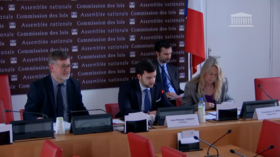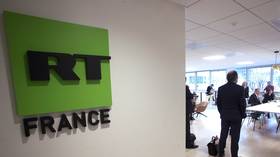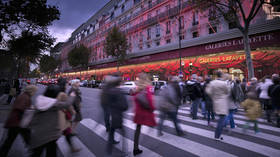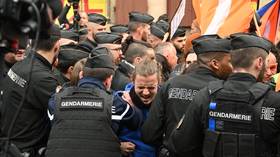France has deployed a one-eyed inquisition against meddling by foreign powers

An interesting show is currently taking place in France’s National Assembly. For two months now, the Investigative Committee on Foreign Interference has been inviting various individuals to testify.
MPs are running the show, while guests start their appearances by swearing to tell the truth, the whole truth and nothing but the truth. But as one can imagine, bits of truth can easily be omitted and the full content of the final report will be greatly influenced by the selection of witnesses heard by the committee.
The three NATO musketeers
Notably among the witnesses, three ardent NATO supporters stand out thanks to the sheet music they seem to share. Nathalie Loiseau, Raphael Glucksmann, and Nicolas Tenzer.
Nathalie Loiseau is a member of the European Parliament (MEP), a former minister during Macron’s first term, and former spokeswoman of the French embassy in Washington. Her vague speech and answers to questions were dedicated to the vicious role Russia allegedly played during the Brexit campaign, the American and French elections, the hacking and harassment of Western institutions and individuals, etc. She denounced the “hybrid war” Russia is apparently waging. She explained how some French politicians are behaving scandalously because of their desire to develop relations with Moscow. She opposes applying “Western free speech” standards to “closed countries with obscure decision-making processes.”
Raphael Glucksmann is another MEP, former political adviser of ex-Georgian president Mikheil Saakashvili, and ex-husband of Georgian and Ukrainian politician Eka Zguladze. He went further with more details but not without difficulties. He talked about Putin’s former adviser Vladislav Surkov as being a kind of dangerous ideological wizard who inspired the “hybrid war” against the West, but fails to mention that Surkov was removed from his position in 2020. Using former German chancellor Schroder and former French prime minister Fillon as examples, he explained that Russia tries to “capture” Western elites. The two men indeed have collaborated with Russian companies, but after they had retired from politics. He then went on with China’s case, the serious problem of Hungary’s unwillingness to comply with the enlightened Western outlook on geopolitics, and his deep wish to see the EU work closely with NATO to fight the fake-news epidemic. For years, Glucksmann has been a kind of unofficial spokesman for NATO, denouncing Beijing’s policies in the West and any move from Moscow to oppose what it sees as a threat against Russia.
After these two very poor rhetoricians, we need to mention Nicolas Tenzer. This former member of the American Aspen Institute think tank was much more articulate but didn’t hide his own fanaticism. His whole presentation was dedicated to Russia. So, according to Tenzer, Russia not only meddled in Brexit and Western elections, it also encouraged the turmoil of the Yellow Vests and protests against vaccination policies during the Covid-19 pandemic. According to him, “there is no reason to make any difference between the Islamic State or Al-Qaeda and Russia. Except that Russia killed way more people.” Tenzer, who last year explained on a TV show that NATO had never harassed any country, then violently criticized all the French personalities who agreed to collaborate on any level with Russia or even to give interviews to RT.
The three experts are adamant: Russia and China (but mostly Russia) are authoritarian states jealous of the Western standards that they wish to destroy. This boosted anti-Russia rhetoric is topped off with the emotional intervention of journalist Cecile Vaissie, but as she has no influence whatsoever, we won’t dwell on her case.
The MPs’ choice
Many witnesses were people like Thomas Gomart, head of the French Institute of International Relations, a think tank that tries to distance itself from politics. But among the other summoned guests were quite a lot of personalities who have something in common. What can it be?
Jean-Maurice Ripert is in line with the Western agenda on all fronts, but has been the French ambassador to Russia and China. Former French minister Maurice Leroy, who had been in charge of the “Grand Paris” project, was hired years ago by a Russian company to develop “Grand Moscow” – so he lives in Moscow, is married to a Russian citizen, and received a Russian passport in 2021.
Former French minister and current MEP Thierry Mariani has a Russian wife, and has for years been trying to foster relations between Paris and Moscow with his association, Dialogue Franco-Russe. However, he made the apparently criminal mistake of going to Crimea after the peninsula voted to join the Russian Federation in 2014.
Journalist Regis Le Sommier and entrepreneur Charles d’Anjou founded Omerta, a new media outlet, and have been reporting from both sides of the front in the ongoing conflict in Ukraine. The French MPs were very curious about how Omerta was funded, since Charles d’Anjou had lived in Moscow in the past and speaks Russian. They also asked why the media outlet had a “pro-Russian and anti-woke” line. Indeed, Cecile Vaissie had said Omerta had to be “watched,” because its positions were close to the Kremlin’s.
So far, and as the committee is coming to its end, I have not yet seen any intervention in relation to witnesses because they were working for American companies, had an Israeli passport, created media exclusively reciting NATO’s narrative, or had married a Ukrainian woman.
The sole and noticeable exception in this McCarthyist witch hunt has been former minister of economy Arnaud Montebourg. During his testimony, Montebourg explained how the most trusted ally of Paris, the US, has been for years very effectively indulging in racketeering against French banks and companies, jailing a French businessman, buying out French corporations, etc. He himself tried to avoid the takeover of French key assets by the US, but his follower, Emmanuel Macron, ended up giving the whole circus away. Montebourg, who knows the machine from the inside, very convincingly shared how big American corporations work with the US administration. The rumors concerning Russia' and China – even if proven true – seemed, by comparison, quite ridiculous threats. However, the MPs did not appear very interested. They did not want to hear about the US spying on European heads of state. Instead, they wanted something to chew on about Moscow and Beijing from him.
The hearing of former Prime Minister François Fillon on the 2nd of May was even clearer: the committee president went straight to the point. Fillon, who left his position in Russian companies after the beginning of the military operation in Ukraine, delivered an excellent presentation. Like Montebourg, he talked about “unacceptable” acts of US interference, but also about Chinese ones, Moroccan ones, Algerian ones… and went on to say that when the Russians try to meddle, they usually do it in a very unsubtle way. According to him, when the French were dealing with Russians during his time, France never lost any negotiation. He added that countries always try to meddle in others’ affairs: France used to have a very strong communist party, which was reliant on the Soviet Union. It was tolerated. Geopolitics was different at the time. Fillon, who held various positions of political authority for 36 years, has a broad vision of the evolution of the world. He wanted to elaborate on the boomerang effect of sanctions that unilaterally come from the West, on the subsequent loss of influence of the US on global affairs, on the rise of the yuan as the next main currency… but the MPs wanted to hear more about Russia.
The behavior of the “commissars,” as they call themselves, is quite astonishing for a political body that claims to be the embodiment of a liberal democracy. First, because they show how ignorant they are as they boast about passing a law concerning the condemnation of the Holodomor as genocide, but they apparently forget that it was the result of Soviet policies at a time when very few Russians were in charge and many died as well in the process. Contemporary Russia has nothing to do with that.
Secondly, their geopolitical bias and blindness is too obvious. The committee is composed of MPs from the entire French political spectrum. However, they all have the same attitude and questions. The rapporteur explained that, for any normal individual, RT and Sputnik are only propaganda instruments and then classifies, out of the blue, one of the witnesses in his absence as “far right.”
Even when specialist Thomas Gomart described with precision the method and work of his institute, the rapporteur’s question could be summarized like this: “That’s very interesting, but tell us about Russia and China.” Another MP hailed the “courage” of Nicolas Tenzer, and the “exhaustive and worrying explanations” of Glucksmann. The committee constantly asks why someone would choose to live in Russia, “such a different country, with such a different language and such different institutions.” Unfortunately for them, when they questioned Charles d’Anjou, they found out he now lives in Dubai. They seemed disappointed, they expected something Russian. But they didn’t want to know why he chose Dubai. Strange. As for me, I am quite sad they did not invite me to the party.
At the end of Francois Fillon’s hearing, the president of the committee had one last question about US spying on European leaders asking, “what has been done to prevent this?” Fillon explained with regret that it is a cultural problem: “Everybody thinks it’s normal, because it’s our ‘American friends’, so nothing was done […] that’s the real issue.” Indeed.
Speaking on the phone with a relative in France, I was half surprised by the reaction of the rare French people who follow this show. They tend to consider the lack of suspicion towards US meddling as normal, either because the US is “a democracy” or because “it has been like this for decades.” The colonization process of the EU was achieved a long time ago, but the ‘tailism’ and lack of reaction to this servitude might be the last nail in the coffin of Western Europe’s political existence.
The statements, views and opinions expressed in this column are solely those of the author and do not necessarily represent those of RT.















